
| The Day After - Discussing and Analyzing the Midterm Elections ...> |
| Nov. 5, 2014 - Various
news organizations and interest groups held events the day after the
midterm elections to discuss and analyze the results. There did
not seem to be as many press conferences as in past years, however. National Journal National Journal senior political columnist and editorial director Ron Fournier led off "The Day After Conference" moderating a discussion with pollsters Whit Ayers and Celinda Lake. Ayers described the outcome as "a whopping rejection of this president." He said Republicans must now demonstrate "that we can govern" and pointed to the principles announced by RNC Chairman Reince Priebus (+) as a good starting point. Ayers described Obama as "the most arrogant politician of my lifetime." "Obamacare was an albatross around the necks of Democrats who voted for it," Ayers said. "This is a classic wave election," Ayres stated, noting that "waves break late." Celinda Lake stated, "The Democratic agenda was not rejected last night." As evidence she pointed to passage of minimum wage measures in four states "when voters had the ability to vote directly on the issues." Lake said that Democrats had overestimated the women's vote. She said, "It was an election that sent a message: get something done for a change." After the opening segment came a discussion with former Senators and members of Congress. Former Sen. Bob Bennett (R-UT) noted that "half of the Senate is in their first term;" what they know is continuing resolutions and omnibus spending bills. Bennett said he hopes Senate Majority Leader Mitch McConnell will restore regular order, where bills are debated on the floor of the Senate, amendments are considered, and bills go to conference [committees]. "When that begins to happen, all kinds of good things will happen," Bennett said. "Mitch will focus on the institution and make it work," he said. |
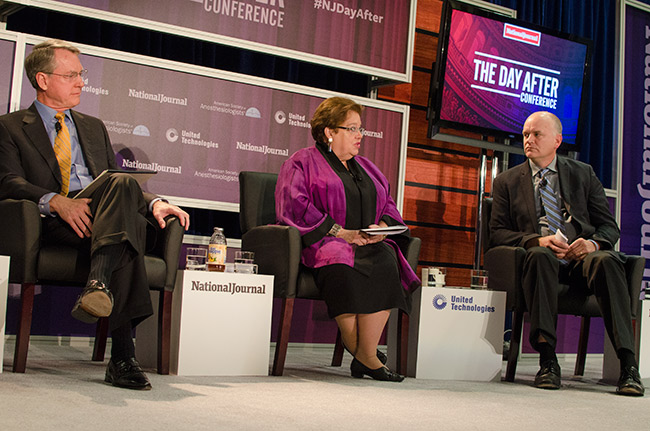 |
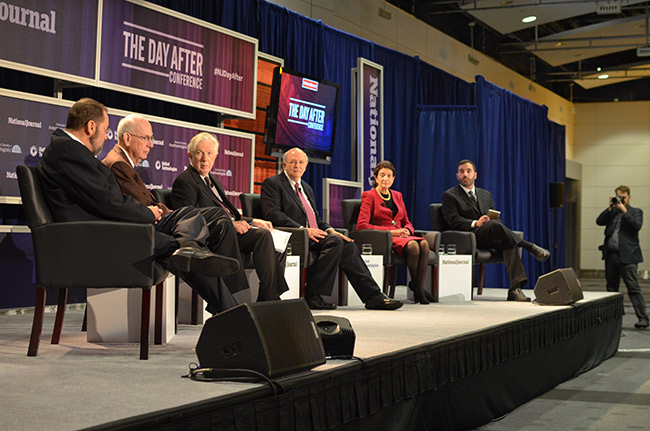 |
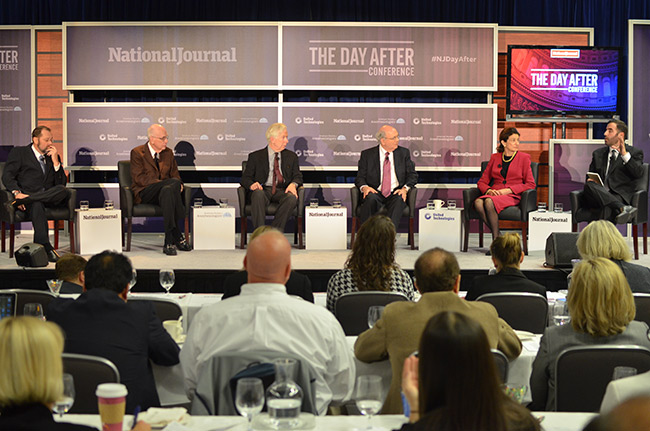 |
| Faith
&
Freedom
Coalition Ralph Reed, founder and chairman of the Faith & Freedom Coalition, discussed the importance of the conservative Christian vote and the accomplishments of his organization in a press conference at the National Press Club. [press release] Reed described the election as "a referendum on the failed policies and the incompetence of this administration." He said conservatives "have closed the gap" in digital, big data and the use of technology." Reed said FFC has a database of 33 million faith-based voters, about one-third of whom are Catholics, appended with consumer information such as magazine subscriptions, credit card information, and even categories of music people select on services such as Spotify and Pandora. "The data is getting better all the time," Reed said. FFC is able to reach directly reach voters in a number of different ways including mail and calls, home visits, text messages, and targeted digital ads. The media will become less and less important, said Reed. Asked about 2016, he said, "There is no path to the [Republican] nomination that doesn't go through the toll booth of the evangelical vote." However, Reed said, "This election isn't over yet." "We're totally focused on Louisiana," Reed said; he expected FFC would open five regional offices and have 100-200 volunteers and supervising staff on the ground for the Dec. 6 runoff between U.S. Sen. Mary Landrieu (D) and U.S. Rep. Bill Cassidy (R). |
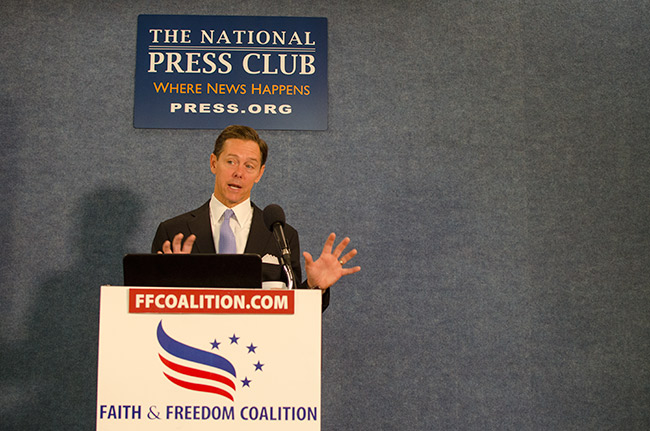 |
| Bipartian
Policy
Center The Bipartisan Policy Center held a forum "A Path Forward: What's Next for the Divided States of America" featuring former Senate Majority Leaders Trent Lott (R-MS) and Tom Daschle (D-SD). Lott said it is "incumbent upon the Republicans to show some results." Daschle said he is "hopeful that the common ground advocates will win out." The two discussed the possibility of a return to regular order in the Senate. Dasche said Majority Leader Harry Reid had sought "to protect his members from tough votes." "It didn't work," said Daschle. Lott said he is optimistic Congress can address a number of issues early next year, including tax reform (specifically, working to lower the corporate rate), trade, and even immigration (if it is divided into three pieces: border security, a visas and those already here). Daschle said that looking at a map of election results he is concerned that the Democrats "are sort of becoming the blue dot party." He said that Democrats must avoid being just an urban party, and must connect more with rural voters. |
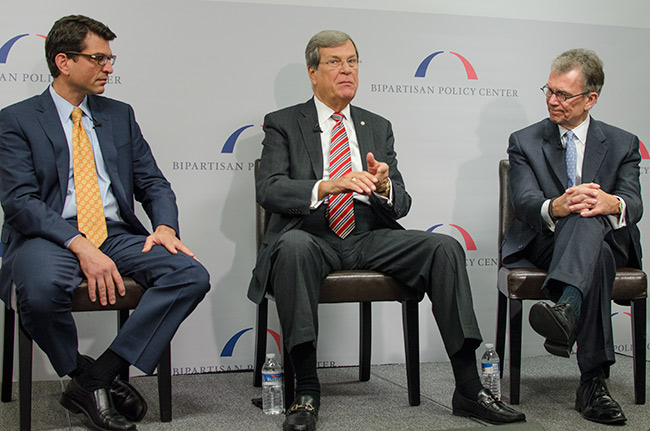 |
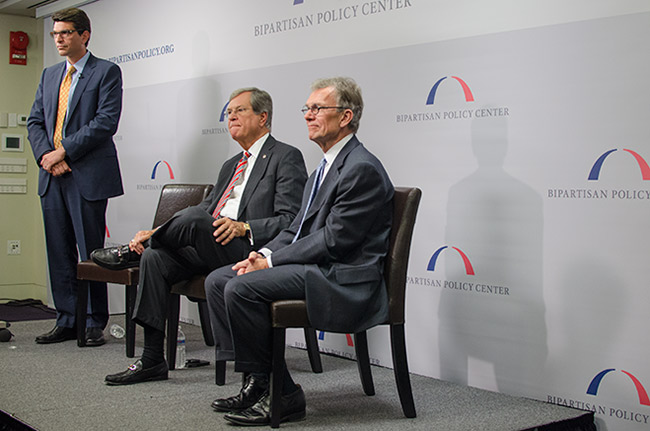 |
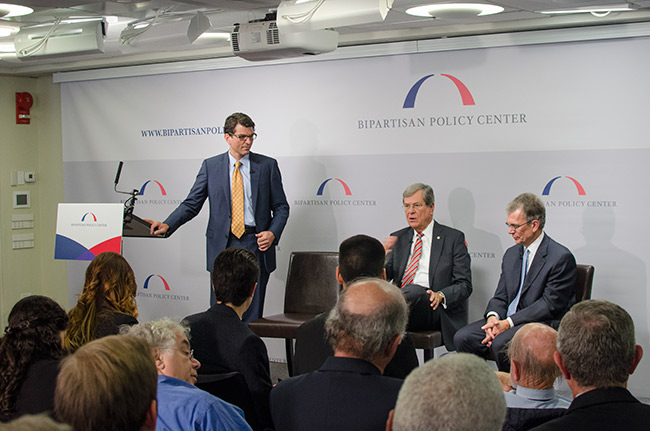 |
| The
Economic
Club
of Washington, DC The Economic Club of Washington, DC held an election panel featuring Mike Allen, chief White House correspondent for Politico; Charles Cook, editor and publisher of The Cook Political Report; and Judy Woodruff, co-anchor and managing editor of PBS NewsHour. The Club's president, David M. Rubenstein, co-founder and co-CEO of The Carlyle Group, moderated the discussion. |
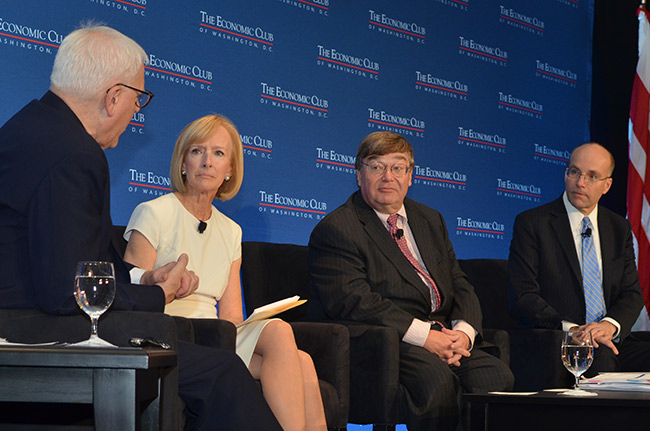 |
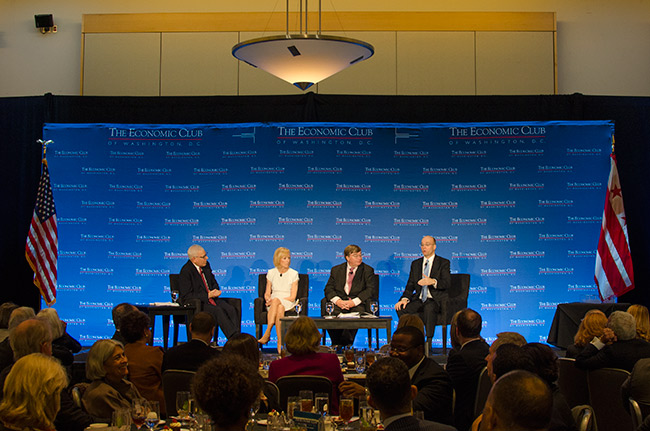 |
| [more reactions
and responses] |
| back > |
